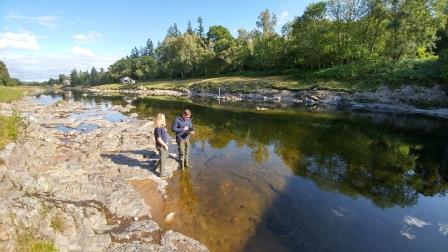Lantra - A career in fisheries management


The River Dee in the north-east of Scotland provides an internationally important habitat for populations of salmon, otters and freshwater pearl mussels, so has been given Special Area of Conservation status by the EU, the highest level of environmental recognition available.
Its 2,300 square kilometre catchment contains moors, mountains, forestry and farmland along an 88-mile journey from source in the Cairngorms to the city of Aberdeen and the North Sea.
Anglers come here from across the world, attracted by the chance to catch sea trout and Atlantic salmon, generating millions of pounds for the local economy and supporting around 500 jobs.
To protect the health of the river and the wildlife within it, the Dee fisheries board and trust has a team of 14, with water bailiffs, development officers, office staff, biologists and other scientists helping to monitor and police the river from source to sea.
The challenge of keeping salmon stocks healthy is being addressed through habitat management and research into the movement of juvenile fish.
Education of the public and encouraging more people to take up angling is a part of their job too, ensuring that fishing tourism can continue to support rural jobs and the health of the river.

A key member of the team is Jamie Urquhart, who has been telling us about his career.
“I’m a biologist with the River Dee trust and my job entails working across the catchment area, looking after environments associated with the river, but also managing the bailiffing team as well. They effectively protect the interests of anglers by making sure that laws regulating fisheries and fish stocks are observed.
“After doing a degree in ecology at the university of Aberdeen and getting a grounding in the subject, I stayed on to work on an invasive species project. I learned a lot about the Dee, the Don and the Ythan rivers, and that really led me to fisheries management as a career option. The experience I gained on these different catchments really helped in getting my current position.
“For me, there’s no such thing as a typical working day. I can be in a different part of the catchment, out in different seasons or out in different weather conditions. Just recently, I’ve been on the river policing with the bailiff team, doing electrofishing with colleagues to monitor juvenile fish numbers, working at one of our fish counters and doing habitat surveys. There really is so much variety in this role.
“Throughout the year, our work continues to change too. At the start of February the fishing season opens here on the Dee, and that runs right through until October. We carry out policing and bailiffing to protect the salmon and sea trout which are coming into the river. In summer, there’s a lot of survey work to be done, and that takes us across the catchment area, looking at our juvenile fish numbers, at freshwater pearl mussels, and monitoring some of the habitat works that we’ve carried out.

“Then through winter there’s counts of salmon and sea trout that are spawning in the river and assessing their abundance over that period.
“The best part of the job for me is having that variety. Although I might spend 20% of my time doing work in the office, most of my working day is actually spent outside, enjoying the fresh air and seeing wildlife which folk often don’t see. It’s a great environment to work in.
“I was brought up on a working estate in the north Highlands, and my family were keen fishers, so that interest has always been there from an early age, I followed that through with my studies at university and it’s led into this career that I’m in now, and it’s something that I’ve been very fortunate to do.
“Living and working in the north-east here is really a bonus. The coast and the Cairngorms are within a short distance of each other and the scenery around us is stunning. It’s a short journey for me to work and I’m out in this spectacular environment throughout the year.
“I’ve recently taken a change in career path and I’m managing the bailiffing team within our fisheries board as well so I’m progressing my career. Although I’ve still got a hand in the practical side of the work, I’m also managing staff now, and looking to continue on that career path further in years to come.
“If someone was looking to start a career in fisheries management I would suggest they get some voluntary experience with a fisheries board or trust in their area. They’d get an understanding of what happens throughout the year, and that’s often a stepping stone into seasonal or even permanent employment.”
Jamie features in a short video from Lantra Scotland promoting careers in fisheries management
To find out more about training courses from the Institute of Fisheries Management, visit https://ifm.org.uk/
Lantra also run a variety of related courses in areas like brushcutting and chainsaw use. Find out more at http://www.lantra.co.uk/